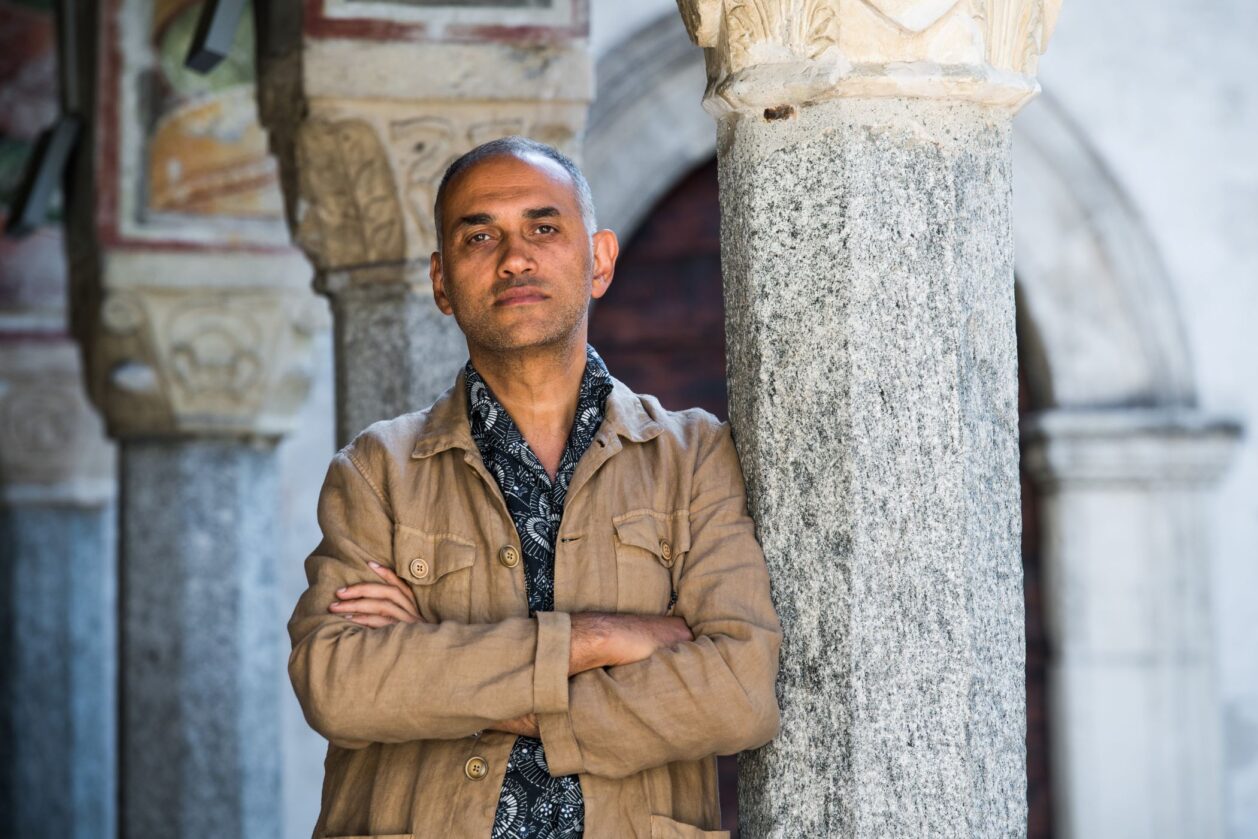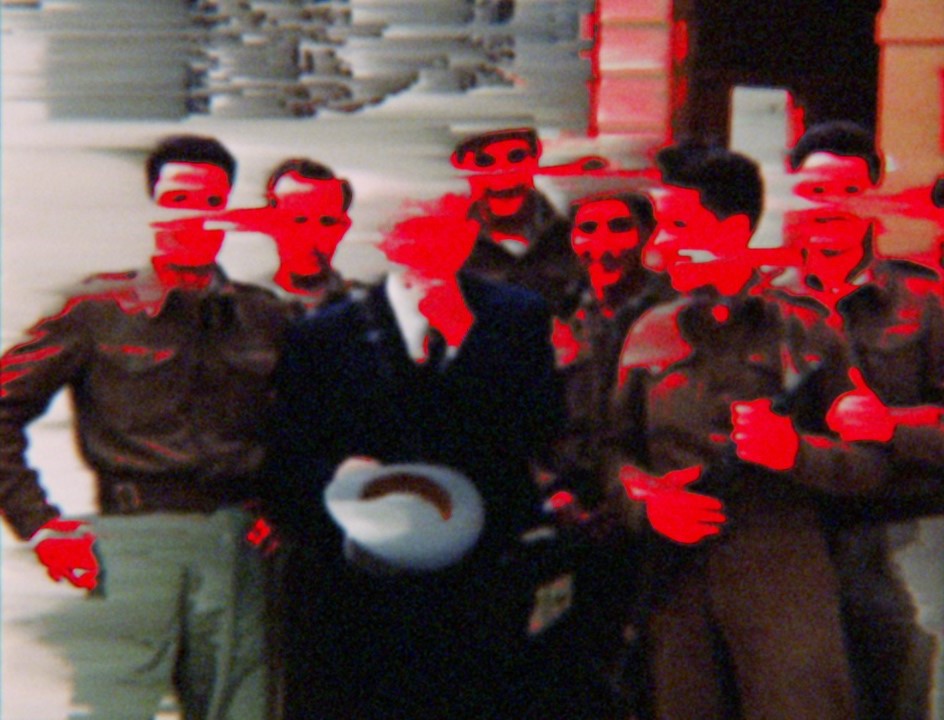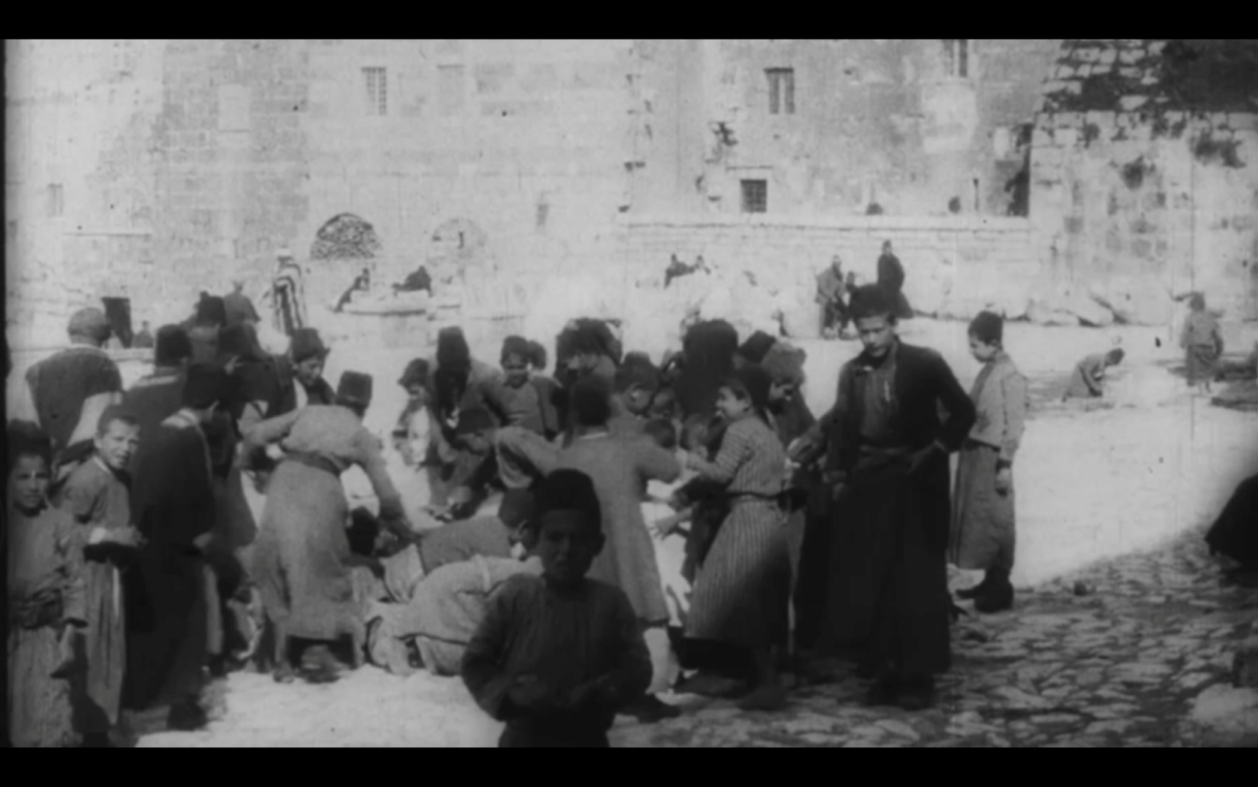November 11th 2024
Interview
ENG
Palestinian artist and film director Kamal Aljafari visits Oslo today for the opening of his retrospective at Kunstnernes Hus.
Kamal Aljafari. Photo: Giampiero Assumma.
As Israel continues its genocidal mass killings and destruction in Gaza into a new year, it seems obvious that what is under attack is all Palestinian life – the people, the land, its nature, culture, and history. At the same time, the realisation that this is not something that started last year, but rather a hundred years ago, seems to be spreading alongside an increased interest in Palestinian history and culture.
Today, 7 November, Kunstnernes Hus in Oslo will open a retrospective of the work of the acclaimed Palestinian artist, film director, and producer Kamal Aljafari, promising an insight into his longtime project of unearthing erased histories of the Palestinian people.
Although Aljafari has lived abroad ever since he left his homeland for Germany to study at the Academy of Media Arts in Cologne back in 1998, most of his work relates to Palestine, exploring the power of cinema to bear witness. In his captivating work he mixes fiction and non-fiction, often appropriating and modifying archival materials and found footage. Aljafari’s work has been shown at the MoMA, Tate Modern, and last year’s São Paulo Biennial, as well as numerous film festivals around the world, including the Mirage festival in Oslo last month, where his latest film, A Fidai Film (2024), received an award for best sound design.
The Aljafari retrospective is the ninth edition of the ‘Silver Series’ curated by Abirami Logendran, who will lead a conversation with the artist at the opening. Previous editions featured Mike Kelley, Pierre Huyghe, Camille Henrot, Ed Atkins, Sky Hopinka, Jeremy Deller, and Shirin Neshat.
Last week, I met Aljafari for a video conversation in which we delved into both his work and his experience of being a Palestinian artist in Germany.
Kamal Aljafari, A Fidai Film, 2024. Still from film.
You seem to be more interested in memory and visuality than in conventional storytelling. Could you share a little bit about how you worked with the images in A Fidai Film?
This particular project started with the idea of trying to find some film materials that were stolen from the Palestinian Research Center during the Israeli invasion of Beirut in 1982. When I came across some of the films that were catalogued by the army, I was really struck by the way they were treated. Especially how they had added captions that turn them into something quite dehumanising. Anything becomes a source of danger, even a woman cooking in a tent, or a boy walking in the mud. They were done for internal use for the army, but through that we can really understand how images are being used against the people who appear in them, as material for intelligence, but at the same time also keeping them hidden in military archives. You are not even allowed access to your own image, your own memories. So I started working with these ideas, trying to make a film with them. The first thought I had was that I should really scratch, that I should sabotage these dehumanising captions. And this later became the language of the film and what the film is all about, trying to create a counter-image and a counter-narrative by using these looted materials and other materials that I appropriated from Israeli colonial archives, including films that were shot by Israeli settlers of Palestine. By the end of this process it became a film narrating the history of Palestine through images.
How were you able to get hold of this footage? From what I gather, it is still in the possession of the Israeli army.
What I got hold of is really very little. I managed to collect it from different private people that had access in one way or another – which was in itself a very humiliating process because they were Israeli researchers that studied these images. For me, they were the second looters because they kept it for themselves and made a career out of it, and also kept refusing to give back the films and the photographs to their Palestinian owners. I had to get in touch with these people, and it was very unpleasant because they would negotiate with me all the time – what to show me, what to give me – and when they gave me the material, they gave me very compressed material so I couldn’t use it, and they kept the original. It was really an awful experience. Finally, I managed to work with even this low quality footage that some of them gave me. But I didn’t have any direct access to these archives, you know, and this is quite symbolic of the apartheid situation of the Palestinians; we basically lost everything, and we don’t have access to these archives. That’s why I came up with this idea of “The Camera of the Dispossessed” in my film.
Kamal Aljafari, The Camera of the Dispossessed, installation view from the 35th São Paulo Biennial, 2023.
You also used this material in an installation with that title, The Camera of the Dispossessed, at the 35th São Paolo Biennial.
Yes, actually it was commissioned by the São Paulo Biennial. So I did an installation with it, and then also the film, A Fidai Film.
In your films you give very little explanation, you let the images speak. When I see these historical images that you use in A Fidai Film – for instance, from Palestine before the Nakba – I am kind of aware that if this were a documentary there would be a voiceover informing me about what I see.
I really believe that the role of the artist or the filmmaker is to show the bottom of the ocean, and not to describe it. I think the film puts you in a process that is poetic and human by showing the place, the people, and the violence that has been committed against the people of Palestine over the last hundred years – also before the Israelis, by the British. I always believed that showing is strong enough without having to indicate where we are, exactly. Because you see. You see who are the occupiers and who are the occupied. And the story of Palestine also resembles other stories, other places that were colonised and destroyed. Now that I screen the film, I experience that people from other countries affected by colonialism and violence identify themselves with that. People have a sensibility to what they are seeing and they can recognise the images without having to recognise the place. Because, finally, it’s not just about this specific place. I wanted to work with that and to work with the pattern that I found in the material, which is the pattern of violence and oppression that was repeating itself. Like the collective punishment that was already started by the British: burning and bombing the homes of people, arresting the men, destroying villages wherever there was resistance. Which is a practice that was adopted by the Israelis and has been practised until today. Basically, this pattern and the repetition became the structure of the film.
Kamal Aljafari, A Fidai Film, 2024. Still from film.
Could you talk about the elements that you added to the images, like the use of red colour, the red figures?
Yes, these interventions were quite important to transform the old historical footage into something related to the present. That’s the idea behind reworking the image with visual effects and the red colour as an act of sabotage and reclamation. Sometimes it is done to create a new meaning out of it, which becomes more metaphorical, like in the scene with the couple on the beach, by masking their faces in red, or when the sea becomes a sea of blood. The red colour was helping me a lot to express myself artistically and politically.
You also use the red colour to cover the captions that you mentioned, that the Israeli army added to the images.
By doing that, I believe that a kind of truth that was kept hidden, comes out. It works in both ways: to underline a certain occupation of the image, but also to free the image and allow us to see the background. And I think that these interventions were essential for me to express myself and to make a film which is very personal – almost autobiographical – because I am telling the story of the country that I come from.
Kamal Aljafari, A Fidai Film, 2024. Still from film.
Some of your works are even more autobiographical, like An Unusual Summer (2020). There you use your father’s footage and include very personal written commentary.
Yes, this was personal and more directly autobiographical, because you see the daily life of my family, moving between their house and their car, and the neighbourhood. I discovered these tapes that were made by a surveillance camera installed by my father because someone used to break the window of his car. An Unusual Summer really becomes a diary about the daily life in the neighbourhood where I came from, an investigation of daily life and the endless stream of characters that pass by this camera, that filmmakers don’t have the patience to pay attention to. And that’s the concept of the film, so to say: on my father’s camera, everyone has the chance to exist. In a way, I am making a kind of proto-cinema – with the intertitles and focusing on just one corner of the street where everything is expressed. In fact, the whole universe is revealing itself. I work in a way that gives few indications but takes you on a journey which is universal. It should be universal. About the human condition, about people – any people.
By trying to discover who threw the stone at my father’s car, I became an investigator, and through that I developed an interest in people and the biographies of people, who they are, by “suspecting” them. But it’s a double game, making them the main characters of life. This work with images allowed me to somehow poetically connect with the place where I was born, in Ramle, where Palestinians live in the ghetto. I always find a way – or subjects find me – to return, keep returning. It has already been more than two decades since I left Palestine.
Kamal Aljafari, An Unusual Summer, 2020. Still from film.
Your films are in a way quite silent, even when you use sound. I get the impression that you have a very conscious use of sound in your films. Could you say something about this?
I think what is really interesting and fascinating about sound is that sound does not need to be translated. It does not have an identity like people have identities. Sound can transform everything into something emotional. It touches people and it’s direct. When I found the tapes that I used in An Unusual Summer, they had no sound. Once I started working on the sound, the film became alive. Sound is a form of communication that I find to sometimes be stronger than images. Because it enters you without checkpoints. In that sense, working with sound that is quiet, meditative, is for me a way to connect with people, to express myself and to put you in a certain state of mind.
For example, the boy walking in the mud in A Fidai Film, once we added the sound, it suddenly had an emotional dimension which it didn’t have before; it became painful to watch. The same with the surveillance camera. It’s something very cold – you see people passing – but once you add their steps, you add feeling to it, they become individuals with personality. Working with sound is really quite essential to me to establish that aspect where images have an emotional dimension and a human dimension.
I also noticed the use of poetry in your films. In A Fidai Film you use texts by the Palestinian poet Ghassan Kanafani, and Balconies (2007) starts with a poem by the Spanish poet Federico García Lorca.
Kamal Aljafari, Balconies, 2007. Still from film.
I look at the poems as something that helps me to express myself. Sometimes I borrow poems that help me to narrate what I want to narrate. In the case of A Fidai Film, I worked with texts by Ghassan Kanafani for their quality as a testimony to different periods of the Palestinian experience, the fates of individuals in this context. Sometimes I use texts that I write myself – like the end credits of my films in Recollection (2015), An Unusual Summer, and A Fidai Film…
Yes, those texts are not exactly what one would normally think of as “end credits.”
I want to use the language of cinema, but to take it somewhere else, to create a new language out of it, which is more personal and crosses borders.
Is it right that you live in Germany?
Oh, I am in Paris now. Germany, I lived there for a long time, but it became impossible for me to stay there. A Fidai Film has been shown in almost every country possible, at festivals, but still no festival in Germany wants to screen it.
That was going to be my next question, if you had experienced being cancelled or censored.
My work is completely ignored and cancelled in Germany. And the same for other Palestinian artists. You know, we don’t exist. They basically want to remove us from the scene.
Kamal Aljafari, Recollection, 2015. Still from film.
You are talking specifically about Germany now?
Yes. I face this problem only in Germany. In other countries, despite the positions of governments and political difficulties, there is always a space, even if sometimes a narrow space. But in Germany, it is sealed off. And it became really ridiculous because my film was financed in Germany, but no film festival wants to screen it there. All of these cultural institutions found themselves forced to adopt the position of the government in order to survive. Sadly, it’s a society that believes in and follows authority. And for me, that is the biggest sign that the way they dealt with the Second World War and the Holocaust led to wrong conclusions.
Artists, culture workers, or filmmakers either stand in solidarity with Israel, meaning practically standing with the genocide, or they don’t have the courage to take a critical position. It’s quite extreme in comparison to other countries. Of course, there are people that are unhappy with it, but nobody is expressing that because they all fear the authorities. For me, the most dangerous part of the German condition is the belief in authority, Obrigkeitsglaube, which is deeply rooted. Many Germans even justify the police’s violent suppression of peaceful demonstrators in Berlin. And this belief in authority is at the core of the crimes that were committed in Germany during the Second World War.
My impression is that you are not alone in leaving Germany these days.
I know many Palestinian artists that have been based in Berlin and Germany who are looking for alternatives now; they don’t want to stay. It’s very sad because Berlin is an international city. But what is happening is that all the non-Germans that work in cultural institutions, they find that they have to adapt to the German narrative, to the German psyche, to the German feeling of guilt and their cowardice, that we don’t share. I mean, we didn’t commit the Holocaust.
Kamal Aljafari, Recollection, 2015. Still from film.


 Kamal Aljafari. Photo: Giampiero Assumma.
Kamal Aljafari. Photo: Giampiero Assumma.





